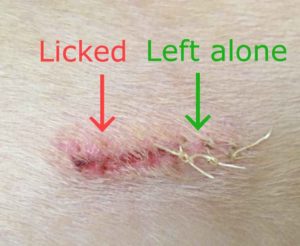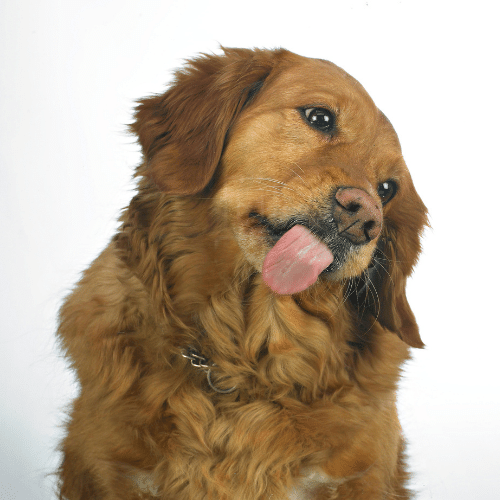
The family dog however stood up and began to lick the bleeding knee. Should Dogs Be Allowed to Lick Their Wounds.

But when dogs and cats are truly injured allowing them to lick their wounds can do more harm than good.
Dog licking my wound good or bad. Many mammal species cats rodents horses primates are known to exhibit wound-licking behavior. The reason is probably that in pre-medicine times wound licking was the best option to clean a wound and promote its healing. Facts About Dog Saliva.
Depending on the wound your dogs licking can be positive or negative. Canine saliva can be helpful in cleaning your wound and even healing it. It is said that their saliva may have antimicrobial and healing properties.
Yet it may be important to not let your dog go too crazy with licking away at your wounds. Although your dog means well when it tries to lick your wounds canine saliva can cause infections in humans. As dog bites carry risk of infection so does licking.
It is rare for dog saliva to cause serious injury but it has in more than one case. When it comes to dogs licking their own wounds a heavy amount of licking is likely to break down stitches and suture and re-open any closed wounds leaving them vulnerable to infection and the accumulation of dirt and debris. Also once a dog begins licking at something we often see a vicious cycle of licking worsening of the wound and more licking until your dog is making a bigger possibly infected wound.
So while a little licking may be beneficial its easy for it to turn into a lot of licking which is harmful. Should Dogs Be Allowed to Lick Their Wounds. Every veterinarian knows that animal patients are driven to lick wounds.
We have all seen the destructive force it can be in surgical wound healing. I can recognize a wound that has been licked the instant I see it. Not only does licking potentially introduce infection but the act of licking can break down tissues and suture.
Many people still feel that as a natural response of a dog to a. Reallydont let your dog lick your woundthey have so much bacteria and germs in their mouthsI know he means wellbut thats why if your dog has an op or wound the vet gives you one of those lampshade things to put on him so he cant lick his wound. I know in the wild that dogs and other animals lick their wounds but what else can they do.
This is especially helpful when it comes to a wound that your dog is tempted to lick but should not be licking because it causes more harm than good. Pour 2 cups of apple cider vinegar into an empty spray bottle or you can substitute the vinegar with lemon juice Add 1 cup of white vinegar. But when dogs and cats are truly injured allowing them to lick their wounds can do more harm than good.
Like most animal activities wound licking has its roots in behavior that would be beneficial under different circumstances. When a wild animal licks its wounds it is making the best of a bad. However wound licking could be more harmful than beneficial because the saliva of dogs also contains a lot of harmful bacteria.
If you combine that with the rough texture of canine tongues you get a recipe for problems such as. The benefits of moderate wound licking. The enzymes in dog saliva help destroy the cell walls of dangerous bacteria.
Lactoferrin and other antibacterial and anti-viral compounds can also be found in saliva. Licking a wound delivers protease inhibitors. Unfortunately although dog saliva does have some healing properties the risks carried by allowing dogs to lick wounds are simply too high to warrant licking as a healing tool.
When it comes to dogs licking their own wounds a heavy amount of licking is likely to break down stitches and re-open any closed wounds leaving them vulnerable to. Even the dogs came and licked his sores The dogs would have promoted healing by licking Lazarus wounds since dog saliva contains the antibacterial enzyme lysozyme and stimulating the skin around the wounds through licking would increase healing blood flow to the area. Dogs often lick their own wounds to encourage them to heal.
My dog keeps licking wound now whatDogs might lick their body for grooming reasons to relieve pain or attempt to calm irritation from some type of allergy or injury. Licking a wound is a natural action but occasionally licking may do more harm than good particularly if the injury is something such as an incision. The family dog however stood up and began to lick the bleeding knee.
This appeared to bother the mother much more than the wound itself and she shooed the dog away with a look of disgust. Wound licking is beneficial but too much licking can be harmful. An Elizabethan collar may be used on pet animals to prevent them from biting an injury or excessively licking it which can cause a lick granuloma.
These lesions are often infected by pathogenic bacteria such as Staphylococcus intermedius.